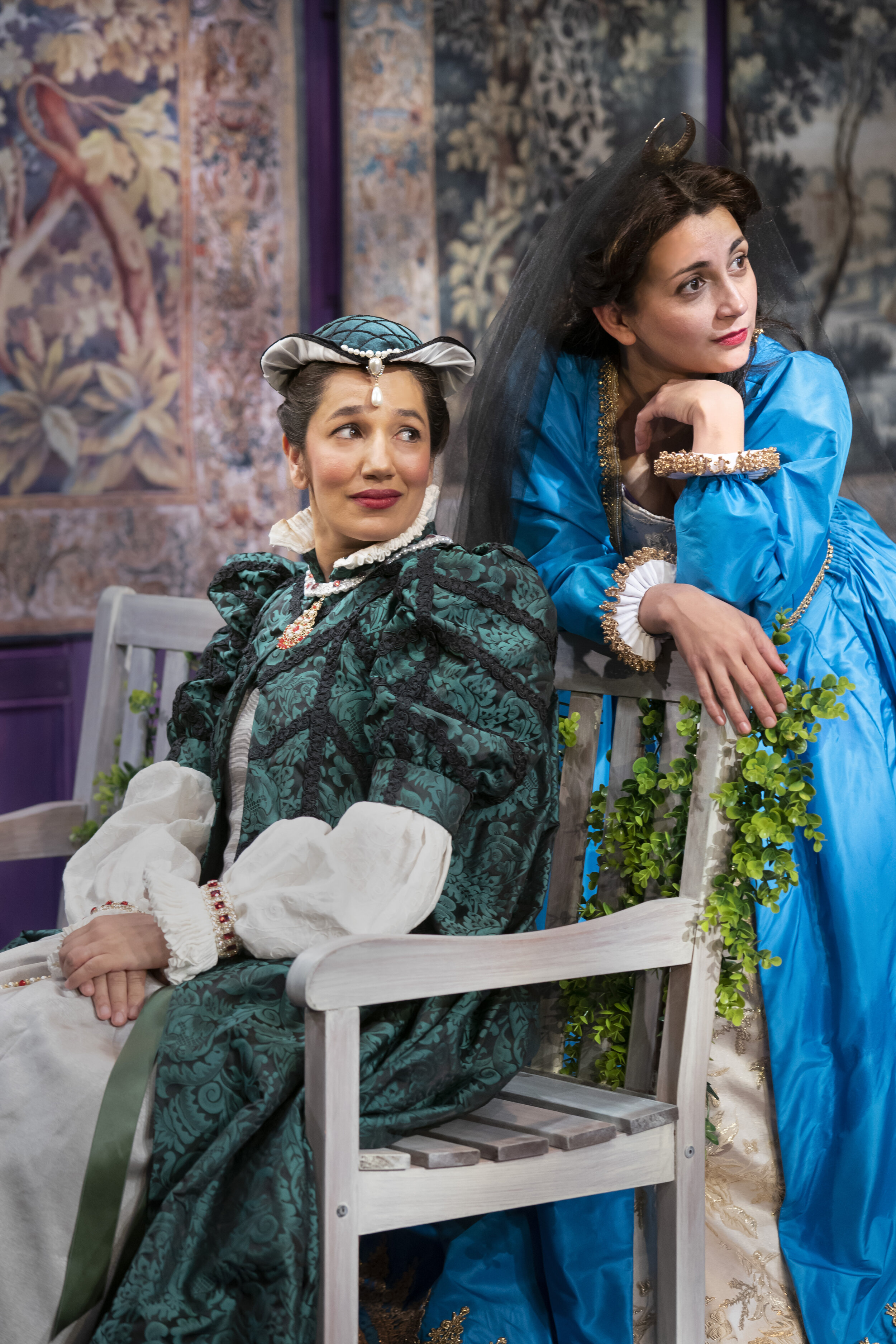Wives
Photo by Joan Marcus
“A wives’ world,” the women sing as they triumphantly dance across the stage. “. . . and the male gaze will be cast away somewhere up among the stars . . .” With its empowered declarations and jubilant choreography, this song could be seen as a moment of victory, well-suited for this play that has already defied expectations by rewriting history – until the composition concludes with lyrics that bring us down to Earth: “eventually…we’re not there yet.”
We’re not there yet, but one day we might be, Jaclyn Backhause assures us in her new play. But not until and unless certain things in society change.
It’s imagining those changes that make this play possible, as Backhause guides the audience through different moments in history, gleefully subverting accepted historic and societal norms that left the women involved relegated to the sidelines or omitted completely. She begins with Catherine de Medici and Diane, wife and mistress of King Henri of France. Following the king’s death, the two women posed to despise each other dare to think outside the box and come together."
Wouldn't it be more interesting if we actually grew to like each other?" they wonder. "To help each other. To lift each other up…. A subversion of what everyone wants and expects to happen."
Naturally, a dance break follows (featuring original music by Kate Marvin). The current and former wives of Ernest Hemingway then come together after his death. Dressed in black and guzzling rum, Hadley Richardson, Martha Gellhorn and Mary Welsh share their collective rage in the fact that Hemingway’s death has left them unable to tell their own stories thanks to their husband co-opting them for his own work. In a particularly clever moment, each of the women dictate heir own obituaries, mocking their late husband’s characteristic style of writing. A ritualistic sacrifice of one of Hemingway’s mounted fish follows, inspiring thoughts of witchcraft — a typical societal reaction to women rejoicing in their power. Swiftly paced and superbly performed, this tableau is the highlight of the evening.
The play then moves to Madhavendra Palace in Rajasthan, India, where, indeed, a woman’s supernatural power is seen as a threat when the Concubine, Witch Roop Rai works to heal Maharaja Madho Singh II from pain and illness. Spying on these sessions is one Mr. Patterson, properly shocked by the sight of a woman breastfeeding a baby, let alone healing a man.
The following scene is opened with a witch stirring a cauldron beneath a portrait of Virginia Woolf as she explains her determination to break free of patriarchal writing structures and came to form the Witches of Oxbridge club, where she wants the female students to have a space in which to find their voices. As a student approaches her to ask about joining the group, she then embarks on celestial into her family history as well as an intimate revelation about her own future. While passionately performed, the scene is at times difficult to follow and anticlimactic.
A confident defiance of dramatic structure as well as societal conventions, Wives is directed with playful humor by Margot Bordelon and skillfully rendered by Reid Thompson’s sets and Valérie Thérèse Bart’s costumes, which easily transition from time and place, despite the script’s colloquial jargon sounding jarring at times. The clear intentions of the play could be heavy-handed in the hands of a less skilled director but are both mischievous and sincere, greatly due to its uniformly excellent cast. While playing multiple roles throughout the brisk 80-minute comedy, Purva Bedi, Aadya Bedi, Adina Verson and Sathya Sridharan find a comedic harmony that elevates the best scenes to greater impact and the weaker ones to enjoyable comedy. Verson’s naïve grief and anger as Mary Welsh especially stands out as she seamlessly engages with Bedi and Bedi.
At times, however, the execution is muddled. Its first two scenes are crisply written and efficiently humorous, but the latter two are would benefit from tighter structure, as would the play benefit from clarifying its intention regarding the relationship between female empowerment and the supernatural — an intriguing subject that has been repeatedly explore in literature and drama. But this critic is willing to bet a work by Backhause would discover something unique and exciting in it.


